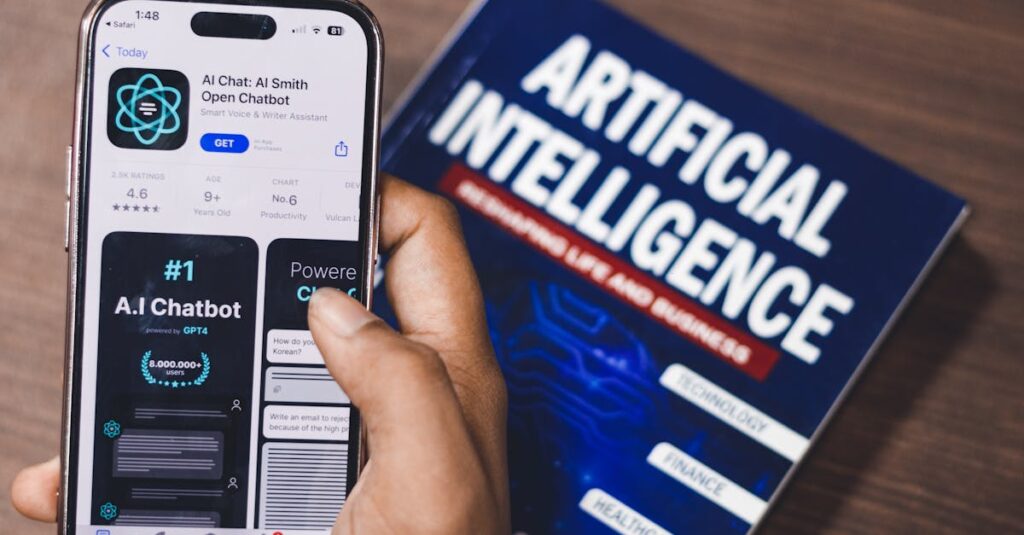In today’s fast-paced business world, artificial intelligence and machine learning aren’t just buzzwords; they’re the secret sauce that can transform an ordinary company into a powerhouse. Imagine having a tireless assistant that never sleeps, learns from every interaction, and helps make decisions faster than a caffeinated squirrel. That’s the magic of AI and ML for businesses.
Table of Contents
ToggleOverview of Artificial Intelligence and Machine Learning
Artificial intelligence (AI) encompasses systems that mimic human decision-making processes. Applications range from chatbots to predictive analytics. Machine learning (ML), a subset of AI, focuses on algorithms that learn and adapt from data patterns. Techniques include supervised learning, unsupervised learning, and reinforcement learning.
Companies harness AI and ML to drive innovation and create competitive advantages. With the ability to analyze vast amounts of data quickly, these technologies uncover insights that human analysts may overlook. Businesses integrate AI tools to enhance customer experiences, streamline operations, and customize products.
Cost reduction is another benefit realized through AI and ML adoption. Organizations report savings by automating routine tasks, which frees up staff for more complex activities. According to a McKinsey report, companies implementing AI technologies can improve operational efficiency by more than 30%.
Enhanced decision-making arises from AI tools that provide predictive analytics. These analytics help businesses anticipate market trends, allowing for proactive strategies. Real-time data analysis equips stakeholders to make informed decisions, resulting in optimized outcomes.
Implementing AI and ML requires careful consideration of infrastructure and data integrity. A strong foundation supports the deployment of algorithms and analytical tools. Leaders must also address ethics and fairness in AI practices to promote responsible use.
Many sectors benefit from these technologies, including finance, healthcare, and retail. In finance, algorithms assist with fraud detection and credit scoring. Healthcare applications include patient diagnostics and treatment planning. Retailers leverage AI for inventory management and personalized marketing campaigns.
Businesses adopting AI and ML stand to gain transformational insights that enhance agility and resilience in an ever-evolving landscape.
Impact on Business Operations
Artificial intelligence and machine learning significantly reshape business operations. These technologies promote efficiency and speed in decision-making.
Enhancing Efficiency and Productivity
AI systems streamline processes and improve overall productivity. By analyzing data patterns, they offer insights that guide strategic actions. This enhancement results in faster work cycles, allowing teams to accomplish tasks with higher accuracy. According to McKinsey, companies integrating AI can enhance operational efficiency by over 30%. Additionally, predictive analytics empower businesses to anticipate shifts in market demand effectively. Such capabilities enable companies to allocate resources more wisely, ensuring optimal performance across various departments.
Automating Routine Tasks
Automation of routine tasks proves beneficial for businesses. AI handles repetitive functions, such as data entry and report generation, freeing employees to tackle complex issues. This shift reduces human error and increases accuracy, which leads to better outcomes. Tasks that once consumed hours can now be performed in minutes, improving speed and reliability. Employees find their workload more manageable and can concentrate on strategic initiatives that require human creativity and insight. Research indicates that automation can lead to significant cost savings, ultimately boosting profit margins.
Applications in Various Industries
Artificial intelligence and machine learning significantly transform numerous industries. Each sector utilizes these technologies to enhance efficiency, improve decision-making, and drive innovation.
Healthcare
AI and ML revolutionize healthcare systems. They assist in patient diagnostics by analyzing medical images and data quickly. Machine learning algorithms predict patient outcomes, thus enabling tailored treatment plans. Additionally, AI applications streamline administrative tasks, such as scheduling and billing, which enhances overall productivity. According to a 2021 study by Accenture, the healthcare industry can save $150 billion annually through AI implementation.
Finance
In the finance sector, AI improves fraud detection and risk management. Algorithms analyze transaction patterns, thus identifying anomalies that indicate fraudulent activity. Credit scoring processes benefit from machine learning by evaluating a broader range of data points, allowing for more accurate assessments of creditworthiness. Research from McKinsey shows that AI applications can lead to a 20% reduction in operational costs. This efficiency in risk assessment underlies the increasing adoption of AI technologies in financial services.
Retail
Retailers leverage AI for inventory management and personalized marketing. Machine learning algorithms analyze consumer data, thus predicting buying patterns and optimizing stock levels. Personalized recommendations based on past purchases enhance customer experiences and increase sales. According to a report by Deloitte, businesses using AI in retail can achieve a 30% increase in operational efficiency. Streamlining processes leads to better resource allocation and improved customer satisfaction, setting retailers apart in a competitive market.
Challenges and Considerations
Adopting artificial intelligence and machine learning comes with various challenges that businesses must navigate to maximize benefits.
Data Privacy and Security
Data privacy and security stand as primary concerns when implementing AI and ML. Organizations collect vast amounts of sensitive information, making it crucial to protect this data from breaches. Compliance with regulations like GDPR or CCPA requires thorough strategies. Businesses must ensure that algorithms used for analysis do not compromise sensitive data. Implementing robust encryption techniques and access controls significantly enhances protection against unauthorized access. Regular audits and assessments of security protocols help identify vulnerabilities.
Integration with Existing Systems
Integrating AI and ML with existing systems poses another significant challenge. Legacy software often lacks compatibility with advanced technologies, leading to potential bottlenecks. Customization of AI solutions may be necessary to ensure seamless operation across platforms. Training staff on new tools ensures smooth transitions and minimizes disruptions. Effective communication between IT teams and business units fosters a collaborative environment for integration. Selecting the right vendors that prioritize system compatibility streamlines the integration process.
Future Trends in Artificial Intelligence and Machine Learning for Business
In the coming years, AI and ML technologies will increasingly focus on enhancing customer experiences. Personalized interactions based on user data can revolutionize marketing strategies. Companies prioritizing customer insights through AI can expect higher engagement rates.
Automation in supply chain management is another area gaining traction. Many businesses are beginning to adopt AI solutions that predict demand fluctuations, improving inventory management. Those companies can enhance their responsiveness to market changes, ensuring optimal stock levels.
Ethical AI practices will take center stage as organizations navigate social responsibilities. With heightened scrutiny on data usage, transparency in AI algorithms becomes essential. Businesses committing to ethical standards can build consumer trust and loyalty.
Another trend involves the integration of AI with Internet of Things (IoT) devices. Smart technologies can collect real-time data that AI analyzes for actionable insights. When combined, these technologies create opportunities for predictive maintenance and operational efficiencies.
The development of explainable AI will also shape future strategies. Organizations require insights into AI decision-making processes to make informed choices. Companies focusing on interpretability can mitigate risks associated with AI adoption.
Collaborative robots, or cobots, will play an increasingly vital role in workplaces. These robots enhance human capabilities rather than replace them, collaborating on tasks that require precision. Businesses investing in cobots can increase productivity while ensuring job security for employees.
Finally, the emphasis on data security in AI and ML applications continues to grow. With regulations like GDPR and CCPA shaping operational practices, ensuring compliance is crucial. Companies prepared for compliance challenges can protect sensitive information while leveraging AI to its fullest potential.
Artificial intelligence and machine learning are no longer just trends; they’re essential tools for businesses aiming to thrive in a competitive landscape. By leveraging these technologies, companies can enhance efficiency and make informed decisions that drive growth.
As organizations continue to adopt AI and ML, they’ll uncover new opportunities for innovation and improved customer experiences. The focus on ethical practices and data security will remain crucial as businesses navigate the complexities of these technologies.
Ultimately, embracing AI and ML isn’t just about keeping pace with change; it’s about positioning for success in a rapidly evolving business environment. The future belongs to those who adapt and harness the power of these transformative technologies.





